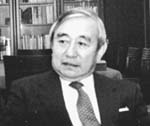Understanding, Trust and Cooperation
It has been nearly two years since Sakutaro Tanio was appointed Japanese ambassador to China. The ambassador has a good command of the Chinese language and a high Chinese cultural accomplishment, he is also an expert in things about China. In his diplomatic career, much of his work concerns Sino-Japanese relationship. He was one of the personnel in the first group participating in the construction of the embassy after the normalization of diplomatic relationship between China and Japan and he has taken part in the formulation of many policies toward China. Mr Sakutaro Tanio said that compared to the time when diplomatic ties between Japan and China were normalized, China had experienced tremendous changes as a result of implementation of the reform and opening policies vigorously initiated by Mr. Deng Xiaoping, of which the greatest change was the "opening of the heart". Tanio added that as a Japanese ambassador to China, his biggest task is to develop cooperation and exchanges between Japan and China and put forward to the Japanese government a proposal for correct China policy. In the opinion of Mr. Tanio, the current Japan-Chinese relationship, on the whole, maintains a good momentum, exchanges have been strengthened in many fields. There are continuous exchanges of top- level visits between the two countries and frequent contacts among personnel at various social levels in the economic, cultural and journalist circles, the two countries are devoted to the establishment of a friendly and cooperative partnership featuring peace and development. In 1998, during his visit to Japan, President Jiang Zemin and the Japanese leader jointly formulated the fundamental policy for future-oriented development of Japan-Chinese relationship, which marked a new stage in Japan-Chinese ties and the establishment of a relationship featuring a rich content and mutual dependence. Viewed from the relationship of trade partners, China is Japan's second largest trade partner, while Japan is China's first largest trade partner. Last year, bilateral trade volume reached a record high of US$62.6 billion, 60 times that in 1972, the year of the normalization of diplomatic relationship between China and Japan. The direct investment made by Japanese enterprises in China's hinterland is third only behind China's Hong Kong and the United States. About 60 percent of the investment made in China by Japanese enterprises are in the manufacturing industry. Joint ventures between Japan and China are scattered in various parts of China. With regard to Sino-Japanese economic cooperation, the ambassador stressed that the Japanese government has never wavered in this regard. China is the largest recipient of the Japanese government's development aid, amounting to 2481,1 billion yen. The government development aid includes Japanese yen loan, technological cooperation and free aid. Of which, China has received 2260,8 billion yen in Japanese yen loans since 1979. Not long ago, government exchange notes on yen loans for 1999 were signed between the two countries, Japan decided to provide 192.6 billion yen worth of low-interest, long-term loans for 19 Chinese projects, which is to be used in environmental protection and in the construction of inland areas. Japanese loans have played a positive role in China's economic construction, particularly in communications, energy, environmental protection and agricultural production. A correct understanding of history is the political foundation for Sino-Japanese relationship. Not long ago, the ultra-rightist forces held in Osaka a rally designed to deny the Nanjing massacre, which greatly injured the feeling of the Chinese people. Tanio said that the general run of Japanese nationals agreed that the pre-war Japan had wrongly taken the road of war, causing tremendous sufferings and losses to some Asian countries and people, including the Chinese people. That kind of view, which denies the fact that Japan had carried out the war of aggression, belongs to the "extreme view" in Japan. The overwhelming majority of the Japanese nationals are of the opinion that firmly bearing in mind the historical lesson, following the road of peace and developing friendship and cooperation with China not only benefit China and Japan, but are also conducive to peace, stability and prosperity in the Asia-Pacific region and the whole world as well. The Japanese ambassador stressed that developing Japan-Chinese friendship and cooperation is one of Japan's important national policies, the newly appointed Japanese Prime Minister Yoshiro Mori will, as always, continue to devote his efforts to establishing a friendly and cooperative partnership between Japan and China featuring peace and development. Owing to difference in national conditions and historical backgrounds between Japan and China, the emergence of conflicts is unavoidable. In the face of the new century, Japan and China should further deepen understanding, develop mutual trust and strengthen cooperation. When twists and turns occur, we should firmly bear in mind the general situation of friendship and cooperation, follow the principle of seeking common grounds while reserving minor differences as advocated by the late Premier Zhou, eliminate negative factors and develop common interests. "understanding, trust and cooperation should become the code of conduct in developing relationship between the two countries". I wish that the people of the two countries would continue their efforts to bring Japan-Chinese friendship and cooperation into the 21st century. | |
| Please visit People's Daily Online --- http://www.peopledaily.com.cn/english/ |
